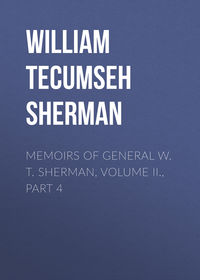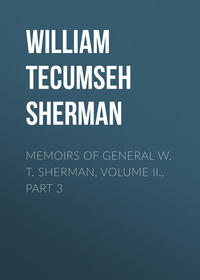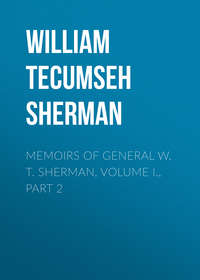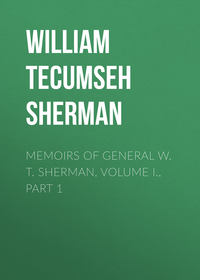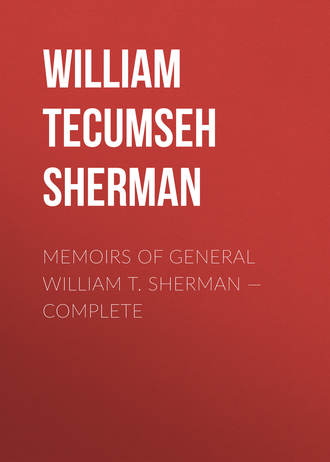 полная версия
полная версияMemoirs of General William T. Sherman — Complete
In due season we arrived off the bar of Indian River and anchored. A whale-boat came off with a crew of four men, steered by a character of some note, known as the Pilot Ashlock. I transferred self and baggage to this boat, and, with the mails, was carried through the surf over the bar, into the mouth of Indian River Inlet. It was then dark; we transferred to a smaller boat, and the same crew pulled us up through a channel in the middle of Mangrove Islands, the roosting-place of thousands of pelicans and birds that rose in clouds and circled above our heads. The water below was alive with fish, whose course through it could be seen by the phosphoric wake; and Ashlock told me many a tale of the Indian war then in progress, and of his adventures in hunting and fishing, which he described as the best in the world. About two miles from the bar, we emerged into the lagoon, a broad expanse of shallow water that lies parallel with the coast, separated from it by a narrow strip of sand, backed by a continuous series of islands and promontories, covered with a dense growth of mangrove and saw-palmetto. Pulling across this lagoon, in about three more miles we approached the lights of Fort Pierce. Reaching a small wharf, we landed, and were met by the officers of the post, Lieutenants George Taylor and Edward J. Steptoe, and Assistant-Surgeon James Simons. Taking the mail-bag, we walked up a steep sand-bluff on which the fort was situated, and across the parade-ground to the officers' quarters. These were six or seven log-houses, thatched with palmetto-leaves, built on high posts, with a porch in front, facing the water. The men's quarters were also of logs forming the two sides of a rectangle, open toward the water; the intervals and flanks were closed with log stockades. I was assigned to one of these rooms, and at once began service with my company, A, then commanded by Lieutenant Taylor.
The season was hardly yet come for active operations against the Indians, so that the officers were naturally attracted to Ashlock, who was the best fisherman I ever saw. He soon initiated us into the mysteries of shark-spearing, trolling for red-fish, and taking the sheep's-head and mullet. These abounded so that we could at any time catch an unlimited quantity at pleasure. The companies also owned nets for catching green turtles. These nets had meshes about a foot square, were set across channels in the lagoon, the ends secured to stakes driven into the mad, the lower line sunk with lead or stone weights and the upper line floated with cork. We usually visited these nets twice a day, and found from one to six green turtles entangled in the meshes. Disengaging them, they were carried to pens, made with stakes stuck in the mud, where they were fed with mangrove-leaves, and our cooks had at all times an ample supply of the best of green turtles. They were so cheap and common that the soldiers regarded it as an imposition when compelled to eat green turtle steaks, instead of poor Florida beef, or the usual barrelled mess-pork. I do not recall in my whole experience a spot on earth where fish, oysters, and green turtles so abound as at Fort Pierce, Florida.
In November, Major Childs arrived with Lieutenant Van Vliet and a detachment of recruits to fill our two companies, and preparations were at once begun for active operations in the field. At that time the Indians in the Peninsula of Florida were scattered, and the war consisted in hunting up and securing the small fragments, to be sent to join the others of their tribe of Seminoles already established in the Indian Territory west of Arkansas. Our expeditions were mostly made in boats in the lagoons extending from the "Haul-over," near two hundred miles above the fort, down to Jupiter Inlet, about fifty miles below, and in the many streams which emptied therein. Many such expeditions were made during that winter, with more or less success, in which we succeeded in picking up small parties of men, women, and children. On one occasion, near the "Haul-over," when I was not present, the expedition was more successful. It struck a party of nearly fifty Indians, killed several warriors, and captured others. In this expedition my classmate, lieutenant Van Vliet, who was an excellent shot, killed a warrior who was running at full speed among trees, and one of the sergeants of our company (Broderick) was said to have dispatched three warriors, and it was reported that he took the scalp of one and brought it in to the fort as a trophy. Broderick was so elated that, on reaching the post, he had to celebrate his victory by a big drunk.
There was at the time a poor, weakly soldier of our company whose wife cooked for our mess. She was somewhat of a flirt, and rather fond of admiration. Sergeant Broderick was attracted to her, and hung around the mess-house more than the husband fancied; so he reported the matter to Lieutenant Taylor, who reproved Broderick for his behavior. A few days afterward the husband again appealed to his commanding officer (Taylor), who exclaimed: "Haven't you got a musket? Can't you defend your own family?" Very soon after a shot was heard down by the mess-house, and it transpired that the husband had actually shot Broderick, inflicting a wound which proved mortal. The law and army regulations required that the man should be sent to the nearest civil court, which was at St. Augustine; accordingly, the prisoner and necessary witnesses were sent up by the next monthly steamer. Among the latter were lieutenant Taylor and the pilot Ashlock.
After they had been gone about a month, the sentinel on the roof-top of our quarters reported the smoke of a steamer approaching the bar, and, as I was acting quartermaster, I took a boat and pulled down to get the mail. I reached the log-but in which the pilots lived, and saw them start with their boat across the bar, board the steamer, and then return. Ashlock was at his old post at the steering-oar, with two ladies, who soon came to the landing, having passed through a very heavy surf, and I was presented to one as Mrs. Ashlock, and the other as her sister, a very pretty little Minorcan girl of about fourteen years of age. Mrs. Ashlock herself was probably eighteen or twenty years old, and a very handsome woman. I was hurriedly informed that the murder trial was in progress at St. Augustine; that Ashlock had given his testimony, and had availed himself of the chance to take a wife to share with him the solitude of his desolate hut on the beach at Indian River. He had brought ashore his wife, her sister, and their chests, with the mail, and had orders to return immediately to the steamer (Gaston or Harney) to bring ashore some soldiers belonging to another company, E (Braggs), which had been ordered from St. Augustine to Fort Pierce. Ashlock left his wife and her sister standing on the beach near the pilot-hut, and started back with his whale-boat across the bar. I also took the mail and started up to the fort, and had hardly reached the wharf when I observed another boat following me. As soon as this reached the wharf the men reported that Ashlock and all his crew, with the exception of one man, had been drowned a few minutes after I had left the beach. They said his surf-boat had reached the steamer, had taken on board a load of soldiers, some eight or ten, and had started back through the surf, when on the bar a heavy breaker upset the boat, and all were lost except the boy who pulled the bow-oar, who clung to the rope or painter, hauled himself to the upset boat, held on, drifted with it outside the breakers, and was finally beached near a mile down the coast. They reported also that the steamer had got up anchor, run in as close to the bar as she could, paused awhile, and then had started down the coast.
I instantly took a fresh crew of soldiers and returned to the bar; there sat poor Mrs. Ashlock on her chest of clothes, a weeping widow, who had seen her husband perish amid sharks and waves; she clung to the hope that the steamer had picked him up, but, strange to say, he could not swim, although he had been employed on the water all his life.
Her sister was more demonstrative, and wailed as one lost to all hope and life. She appealed to us all to do miracles to save the struggling men in the waves, though two hours had already passed, and to have gone out then among those heavy breakers, with an inexperienced crew, would have been worse than suicide. All I could do was to reorganize the guard at the beach, take the two desolate females up to the fort, and give them the use of my own quarters. Very soon their anguish was quieted, and they began to look, for the return of their steamer with Ashlock and his rescued crew. The next day I went again to the beach with Lieutenant Ord, and we found that one or two bodies had been washed ashore, torn all to pieces by the sharks, which literally swarmed the inlet at every new tide. In a few days the weather moderated, and the steamer returned from the south, but the surf was so high that she anchored a mile off. I went out myself, in the whale or surf boat, over that terrible bar with a crew of, soldiers, boarded the steamer, and learned that none other of Ashlock's crew except the one before mentioned had been saved; but, on the contrary, the captain of the steamer had sent one of his own boats to their rescue, which was likewise upset in the surf, and, out of the three men in her, one had drifted back outside the breakers, clinging to the upturned boat, and was picked up. This sad and fatal catastrophe made us all afraid of that bar, and in returning to the shore I adopted the more prudent course of beaching the boat below the inlet, which insured us a good ducking, but was attended with less risk to life.
I had to return to the fort and bear to Mrs. Ashlock the absolute truth, that her husband was lost forever.
Meantime her sister had entirely recovered her equilibrium, and being the guest of the officers, who were extremely courteous to her, she did not lament so loudly the calamity that saved them a long life of banishment on the beach of Indian River. By the first opportunity they were sent back to St. Augustine, the possessors of all of Ashlock's worldly goods and effects, consisting of a good rifle, several cast-nets, hand-lines, etc., etc., besides some three hundred dollars in money, which was due him by the quartermaster for his services as pilot. I afterward saw these ladies at St. Augustine, and years afterward the younger one came to Charleston, South Carolina, the wife of the somewhat famous Captain Thistle, agent for the United States for live-oak in Florida, who was noted as the first of the troublesome class of inventors of modern artillery. He was the inventor of a gun that "did not recoil at all," or "if anything it recoiled a little forward."
One day, in the summer of 1841, the sentinel on the housetop at Fort Pierce called out, "Indians! Indians!" Everybody sprang to his gun, the companies formed promptly on the parade-ground, and soon were reported as approaching the post, from the pine-woods in rear, four Indians on horseback. They rode straight up to the gateway, dismounted, and came in. They were conducted by the officer of the day to the commanding officer, Major Childs, who sat on the porch in front of his own room. After the usual pause, one of them, a black man named Joe, who spoke English, said they had been sent in by Coacoochee (Wild Cat), one of the most noted of the Seminole chiefs, to see the big chief of the post. He gradually unwrapped a piece of paper, which was passed over to Major Childs, who read it, and it was in the nature of a "Safe Guard" for "Wild Cat" to come into Fort Pierce to receive provisions and assistance while collecting his tribe, with the purpose of emigrating to their reservation west of Arkansas. The paper was signed by General Worth, who had succeeded General Taylor, at Tampa Bay, in command of all the troops in Florida. Major Childs inquired, "Where is Coacoochee?" and was answered, "Close by," when Joe explained that he had been sent in by his chief to see if the paper was all right. Major Childs said it was "all right," and that Coacoochee ought to come in himself. Joe offered to go out and bring him in, when Major Childs ordered me to take eight or ten mounted men and go out to escort him in. Detailing ten men to saddle up, and taking Joe and one Indian boy along on their own ponies, I started out under their guidance.
We continued to ride five or six miles, when I began to suspect treachery, of which I had heard so much in former years, and had been specially cautioned against by the older officers; but Joe always answered, "Only a little way." At last we approached one of those close hammocks, so well known in Florida, standing like an island in the interminable pine-forest, with a pond of water near it. On its edge I noticed a few Indians loitering, which Joe pointed out as the place. Apprehensive of treachery, I halted the guard, gave orders to the sergeant to watch me closely, and rode forward alone with the two Indian guides. As we neared the hammock, about a dozen Indian warriors rose up and waited for us. When in their midst I inquired for the chief, Coacoochee. He approached my horse and, slapping his breast, said, "Me Coacoochee." He was a very handsome young Indian warrior, not more than twenty-five years old, but in his then dress could hardly be distinguished from the rest. I then explained to him, through Joe, that I had been sent by my "chief" to escort him into the fort. He wanted me to get down and "talk" I told him that I had no "talk" in me, but that, on his reaching the post, he could talk as much as he pleased with the "big chief," Major Childs. They all seemed to be indifferent, and in no hurry; and I noticed that all their guns were leaning against a tree. I beckoned to the sergeant, who advanced rapidly with his escort, and told him to secure the rifles, which he proceeded to do. Coacoochee pretended to be very angry, but I explained to him that his warriors were tired and mine were not, and that the soldiers would carry the guns on their horses. I told him I would provide him a horse to ride, and the sooner he was ready the better for all. He then stripped, washed himself in the pond, and began to dress in all his Indian finery, which consisted of buckskin leggins, moccasins, and several shirts. He then began to put on vests, one after another, and one of them had the marks of a bullet, just above the pocket, with the stain of blood. In the pocket was a one-dollar Tallahassee Bank note, and the rascal had the impudence to ask me to give him silver coin for that dollar. He had evidently killed the wearer, and was disappointed because the pocket contained a paper dollar instead of one in silver. In due time he was dressed with turban and ostrich-feathers, and mounted the horse reserved for him, and thus we rode back together to Fort Pierce. Major Childs and all the officers received him on the porch, and there we had a regular "talk." Coacoochee "was tired of the war." "His people were scattered and it would take a 'moon' to collect them for emigration," and he "wanted rations for that time," etc., etc.
All this was agreed to, and a month was allowed for him to get ready with his whole band (numbering some one hundred and fifty or one hundred and sixty) to migrate. The "talk" then ceased, and Coacoochee and his envoys proceeded to get regularly drunk, which was easily done by the agency of commissary whiskey. They staid at Fort Pierce daring the night, and the next day departed. Several times during the month there came into the post two or more of these same Indians, always to beg for something to eat or drink, and after a full month Coacoochee and about twenty of his warriors came in with several ponies, but with none of their women or children. Major Childs had not from the beginning the least faith in his sincerity; had made up his mind to seize the whole party and compel them to emigrate. He arranged for the usual council, and instructed Lieutenant Taylor to invite Coacoochee and his uncle (who was held to be a principal chief) to his room to take some good brandy, instead of the common commissary whiskey. At a signal agreed on I was to go to the quarters of Company A, to dispatch the first-sergeant and another man to Lieutenant Taylor's room, there to seize the two chiefs and secure them; and with the company I was to enter Major Childs's room and secure the remainder of the party. Meantime Lieutenant Van Vliet was ordered to go to the quarters of his company, F, and at the same signal to march rapidly to the rear of the officers' quarters, so as to catch any who might attempt to escape by the open windows to the rear.
All resulted exactly as prearranged, and in a few minutes the whole party was in irons. At first they claimed that we had acted treacherously, but very soon they admitted that for a month Coacoochee had been quietly removing his women and children toward Lake Okeechobee and the Everglades; and that this visit to our post was to have been their last. It so happened that almost at the instant of our seizing these Indians a vessel arrived off the bar with reenforcements from St. Augustine. These were brought up to Fort Pierce, and we marched that night and next day rapidly, some fifty miles, to Lake Okeechobee, in hopes to capture the balance of the tribe, especially the families, but they had taken the alarm and escaped. Coacoochee and his warriors were sent by Major Childs in a schooner to New Orleans en route to their reservation, but General Worth recalled them to Tampa Bay, and by sending out Coacoochee himself the women and children came in voluntarily, and then all were shipped to their destination. This was a heavy loss to the Seminoles, but there still remained in the Peninsula a few hundred warriors with their families scattered into very small parcels, who were concealed in the most inaccessible hammocks and swamps. These had no difficulty in finding plenty of food anywhere and everywhere. Deer and wild turkey were abundant, and as for fish there was no end to them. Indeed, Florida was the Indian's paradise, was of little value to us, and it was a great pity to remove the Seminoles at all, for we could have collected there all the Choctaws, Creeks, Cherokees, and Chickasaws, in addition to the Seminoles. They would have thrived in the Peninsula, whereas they now occupy lands that are very valuable, which are coveted by their white neighbors on all sides, while the Peninsula, of Florida still remains with a population less than should make a good State.
During that and preceding years General W. S. Harney had penetrated and crossed through the Everglades, capturing and hanging Chekika and his band, and had brought in many prisoners, who were also shipped West. We at Fort Pierce made several other excursions to Jupiter, Lake Worth, Lauderdale, and into the Everglades, picking up here and there a family, so that it was absurd any longer to call it a "war." These excursions, however, possessed to us a peculiar charm, for the fragrance of the air, the abundance of game and fish, and just enough of adventure, gave to life a relish. I had just returned to Lauderdale from one of these scouts with Lieutenants Rankin, Ord, George H. Thomas, Field, Van Vliet, and others, when I received notice of my promotion to be first lieutenant of Company G, which occurred November 30, 1841, and I was ordered to return to Fort Pierce, turn over the public property for which I was accountable to Lieutenant H. S. Burton, and then to join my new company at St. Augustine.
I reached St. Augustine before Christmas, and was assigned to command a detachment of twenty men stationed at Picolata, on the St. John's River, eighteen miles distant. At St. Augustine were still the headquarters of the regiment, Colonel William Gates, with Company E, Lieutenant Bragg, and Company G, Lieutenant H. B. Judd. The only buildings at Picolata were the one occupied by my detachment, which had been built for a hospital, and the dwelling of a family named Williams, with whom I boarded. On the other hand, St. Augustine had many pleasant families, among whom was prominent that of United States Judge Bronson. I was half my time in St. Augustine or on the road, and remember the old place with pleasure. In February we received orders transferring the whole regiment to the Gulf posts, and our company, G, was ordered to escort Colonel Gates and his family across to the Suwanee River, en route for Pensacola. The company, with the colonel and his family, reached Picolata (where my detachment joined), and we embarked in a steamboat for Pilatka. Here Lieutenant Judd discovered that he had forgotten something and had to return to St. Augustine, so that I commanded the company on the march, having with me Second-Lieutenant George B. Ayres. Our first march was to Fort Russell, then Micanopy, Wacahoota, and Wacasassee, all which posts were garrisoned by the Second or Seventh Infantry. At Wacasassee we met General Worth and his staff, en route for Pilatka. Lieutenant Judd overtook us about the Suwanee, where we embarked on a small boat for Cedar Keys, and there took a larger one for Pensacola, where the colonel and his family landed, and our company proceeded on in the same vessel to our post—Fort Morgan, Mobile Point.
This fort had not been occupied by troops for many years, was very dirty, and we found little or no stores there. Major Ogden, of the engineers, occupied a house outside the fort. I was quartermaster and commissary, and, taking advantage of one of the engineer schooners engaged in bringing materials for the fort, I went up to Mobile city, and, through the agency of Messrs. Deshon, Taylor, and Myers, merchants, procured all essentials for the troops, and returned to the post. In the course of a week or ten days arrived another company, H, commanded by Lieutenant James Ketchum, with Lieutenants Rankin and Sewall L. Fish, and an assistant surgeon (Wells.) Ketchum became the commanding officer, and Lieutenant Rankin quartermaster. We proceeded to put the post in as good order as possible; had regular guard-mounting and parades, but little drill. We found magnificent fishing with the seine on the outer beach, and sometimes in a single haul we would take ten or fifteen barrels of the best kind of fish, embracing pompinos, red-fish, snappers, etc.
We remained there till June, when the regiment was ordered to exchange from the Gulf posts to those on the Atlantic, extending from Savannah to North Carolina. The brig Wetumpka was chartered, and our company (G) embarked and sailed to Pensacola, where we took on board another company (D) (Burke's), commanded by Lieutenant H. S. Burton, with Colonel Gates, the regimental headquarters, and some families. From Pensacola we sailed for Charleston, South Carolina. The weather was hot, the winds light, and we made a long passage but at last reached Charleston Harbor, disembarked, and took post in Fort Moultrie.
Soon after two other companies arrived, Bragg's (B) and Keyes's (K). The two former companies were already quartered inside of Fort Moultrie, and these latter were placed in gun-sheds, outside, which were altered into barracks. We remained at Fort Moultrie nearly five years, until the Mexican War scattered us forever. Our life there was of strict garrison duty, with plenty of leisure for hunting and social entertainments. We soon formed many and most pleasant acquaintances in the city of Charleston; and it so happened that many of the families resided at Sullivan's Island in the summer season, where we could reciprocate the hospitalities extended to us in the winter.
During the summer of 1843, having been continuously on duty for three years, I applied for and received a leave of absence for three months, which I spent mostly in Ohio. In November I started to return to my post at Charleston by way of New Orleans; took the stage to Chillicothe, Ohio, November 16th, having Henry Stanberry, Esq., and wife, as travelling companions, We continued by stage. next day to Portsmouth, Ohio.
At Portsmouth Mr. Stanberry took a boat up the river, and I one down to Cincinnati. There I found my brothers Lampson and Hoyt employed in the "Gazette" printing-office, and spent much time with them and Charles Anderson, Esq., visiting his brother Larz, Mr. Longworth, some of his artist friends, and especially Miss Sallie Carneal, then quite a belle, and noted for her fine voice,
On the 20th I took passage on the steamboat Manhattan for St. Louis; reached Louisville, where Dr. Conrad, of the army, joined me, and in the Manhattan we continued on to St. Louis, with a mixed crowd. We reached the Mississippi at Cairo the 23d, and St. Louis, Friday, November 24, 1843. At St. Louis we called on Colonel S. W. Kearney and Major Cooper, his adjutant-general, and found my classmate, Lieutenant McNutt, of the ordnance, stationed at the arsenal; also Mr. Deas, an artist, and Pacificus Ord, who was studying law. I spent a week at St. Louis, visiting the arsenal, Jefferson Barracks, and most places of interest, and then became impressed with its great future. It then contained about forty thousand people, and my notes describe thirty-six good steamboats receiving and discharging cargo at the levee.


